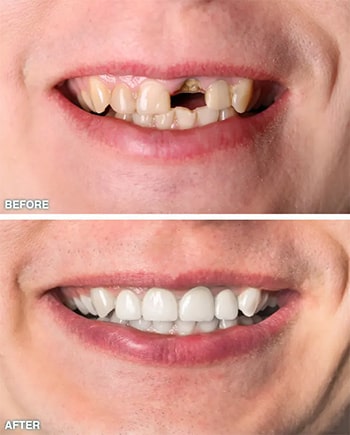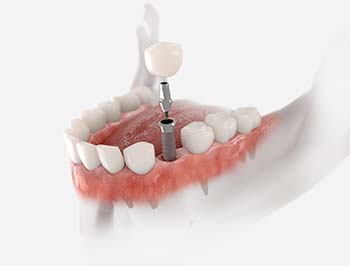Did you know that millions of American adults are missing at least one tooth? In fact, this is one of the most common issues that we encounter at Calm Dental in Los Angeles.
In this article, we'll discuss some of the most common causes of missing teeth as well as the issues that are caused by missing teeth. Then, we will explain how dental implants can be the best tooth restoration solution.
Common Causes of Missing Teeth
There are several factors that can cause missing teeth. In some cases, the teeth never erupt. In other cases, tooth loss is due to bad habits, medical conditions, or other factors.
Below, we will explore some of the most common causes of missing teeth that we encounter at Calm Dental.
Genetics
Some of our patients at Calm Dental are missing teeth due to genetics. Their permanent teeth are unable to erupt due to a malformation of their upper and/or lower jawbone. This is often seen in patients with conditions such as Down Syndrome and cleft lip/palate and is referred to as tooth agenesis. There are three categories of congenitally missing teeth:
Hypodontia:
1 to 5 permanent teeth never erupt
Oligodontia:
6+ permanent teeth never erupt
Anodontia:
permanent teeth are completely absent
Injury/Trauma
Many adults are missing teeth due to trauma from sports injuries, car accidents, or other trauma. If a tooth falls out for any of these reasons, it is possible to save it, if you can seek emergency dental treatment within 30 minutes.
Gum Disease
Gum disease causes pockets to develop between your gums and teeth, which ultimately causes the gums to recede. When gums recede, bacteria can get to the tooth roots and jawbone, which causes them to decay and teeth to come out.
This problem can be prevented if you act quickly. The first sign of gum disease is gingivitis. The symptoms of gingivitis include bleeding when brushing and flossing teeth. If left untreated, gingivitis will progress to periodontitis, which requires extensive treatment.
Additional Factors
In addition to the above factors, there are a few others that contribute to tooth loss:
Cavities or decay
Smoking
Poor nutrition
Little to no access to dental care
Poor dental hygiene habits
Common Issues Caused by Missing Teeth
If you are missing one or more teeth- even if you've been living with tooth loss for some time- it's important to learn about your tooth restoration options at Calm Dental. If you do not, you may experience one or more of the following issues:
Speech/eating
You may not give it much thought, but your teeth impact your ability to speak and eat.
When it comes to speaking, missing teeth can affect the way that air moves through your mouth. You may slur, whistle, or even spit when speaking. This can impact your confidence, making you less likely to start or get involved in conversations.
Your incisors bite/tear food and your molars and premolars grind food, which makes it easier for your body to digest. However, missing teeth make this process difficult. When it's hard to chew, most people choose highly processed foods because they are typically softer and easy to eat. However, these foods lack nutrition, which can lead to malnutrition and digestive issues.
Shifting
When a tooth is missing, the teeth on either side of the gap will shift to close the gap. This causes misalignment, which makes it difficult to take care of your teeth. If you can't properly clean your teeth,
plaque and bacteria will build up in the crevices, ultimately leading to infection and/or gum disease- and additional tooth loss.
Irregular bite
Since the neighboring teeth shift to fill in the gap, as mentioned above, the top and bottom jaws no longer meet properly when the mouth is closed. This problem is known as "irregular bite" or malocclusion, which can create a variety of additional oral and overall health issues. Additionally, your risk of developing TMD, temporomandibular joint disorder, is increased.
Bone loss
Your tooth roots stimulate the jawbone, keeping it healthy, which supports your facial structure as well as other benefits. However, when your teeth are missing, your jawbone loses that stimulation. Since it is not being used, it will begin to deteriorate, and the resources will be sent to other areas of your body.
Gum disease
Your teeth are seated in your jawbone and sit on top of your gums. This prevents bacteria from getting to your gums. However, when you are missing teeth, your gums are exposed to plaque and bacteria, which increases your risk of gum disease. If you have active gum disease and are interested in implants, you will need to undergo gum disease treatment first.
What are Dental Implants?
Dental implants are known as the "gold standard" of tooth restoration because they look, feel, and function more like natural teeth. Traditional dental implants consist of three pieces:
Implant:
inserted into the jawbone, acts as an artificial tooth root
Abutment:
connector that secures the crown to the implant
artificial tooth, sits above the gumline
What to Expect Before, During, and After
The process of getting dental implants takes at least several months, and may take up to a year, depending on how your body heals. Here is what you can expect before, during, and after implant surgery.
Before the surgery
The first step in any procedure at Calm Dental is the initial consultation. During this visit, we will perform a comprehensive exam, including imaging. We will also discuss your questions and concerns, as well as your expectations for treatment. This will help us create a personalized treatment plan.
During the surgery
In order to get dental implants, you will have at least 2 surgeries: one to place the implant and one to place the abutment. Some patients require additional procedures, including extractions, bone grafting, and gum disease treatment.
Placing the implant
We will start by administering local anesthesia to the area. Once that takes effect, we will make an incision in the gum and drill a tiny hole in the jawbone. The implant will be placed in the hole and the incision closed. You will be sent home to heal, which can take up to 6 months.
During this time, osseointegration will occur, which is the process of the jawbone healing around and fusing with the implant. This secures it in place.
Placing the abutment
Once osseointegration is complete, we will open the incision and place the abutment, which is the piece that connects the crown to the implant. A healing cap will be placed on top of the abutment to keep the gum from healing over it. Impressions will be taken so that the lab can fabricate your custom crown.
Choosing your teeth
At this time, we will choose the specifications for your crown. You can choose either porcelain or composite resin. While composite resin is more affordable, porcelain looks more natural and lasts longer. Typically, it takes about 2 weeks for the lab to create your crown.
After
Dental implants do not require any special care. You simply brush and floss them just like your natural teeth. You should also visit the dentist every 6 months for an exam and cleaning. This will allow us to monitor for any issues and treat them before they escalate and potentially lead to implant failure.
Reducing Risk of Implant Failure
Unfortunately, some implant failures can't be prevented. However, there are some things you can do to reduce your risk:
Brush twice daily and floss at least once and use an alcohol-free mouthwash
Visit the dentist every 6 months
Quit smoking
Increase your calcium consumption
Get a mouthguard to protect against bruxism
Avoid damaging habits, like crunching on ice and hard candies
Schedule Your Dental Implant Consultation Today
If you are missing one or more teeth, we encourage you to schedule your consultation today with the team at Calm Dental in Los Angeles. We have the experience and expertise to replace your missing teeth with dental implants.
We are conveniently located at 525 S. Olive Street in Los Angeles. Our office hours are Monday through Friday from 8:40 AM to 6:00 PM. You can schedule your appointment by calling our office at (213) 647-2566 or by visiting our website. We are looking forward to meeting with you and restoring your smile and confidence.
Dental Implant FAQs
The team at Calm Dental in Los Angeles believes that patients should be involved in their care. Therefore, we are happy to discuss your questions and concerns at any time. Below are some of the most common questions that we get regarding dental implants:
Dental implants are designed to be a permanent, lifetime solution for missing teeth- with proper care and maintenance. This includes proper oral hygiene (brushing twice daily, flossing at least once) and visits to the dentist every 6 months for an exam and thorough cleaning.
Patients are given local anesthesia during the procedure, so no pain is felt. There might be some minor discomfort as the anesthesia wears off and during the healing process- but this can typically be controlled with an OTC pain reliever.
If you believe that dental implants are a viable solution for your missing teeth, schedule your consultation with the team at Calm Dental. We can also help if you already have implants and are experiencing issues.
Dental implants are inserted into your jawbone, acting as artificial tooth roots. This provides your jawbone with the stimulation needed to prevent deterioration and restores your natural bite force. This tooth restoration solution looks, feels, and functions more like natural teeth than other options.
Dairy products contain calcium, which is good for your body. However, dairy may also trigger an inflammatory response in the body, which is not good for healing. In addition, dairy may also cause nausea and vomiting, which introduces stomach acid into the mouth, causing inflammation at the surgical site. This prevents the area from healing properly and could cause implant failure. However, once you have healed, you can consume as much dairy as you like because calcium is important for implant success.

